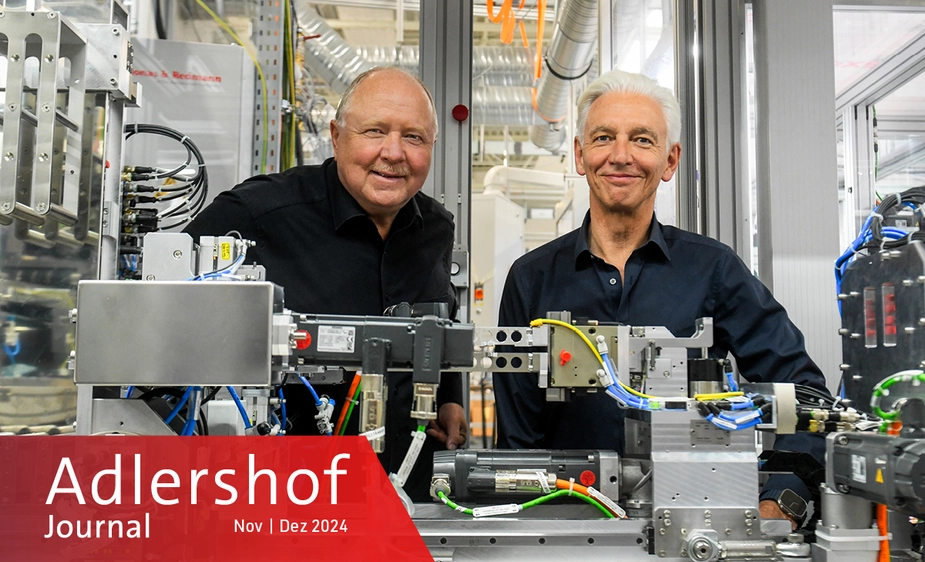Deciding together
Stefan Jonas and Lutz Redmann have been successfully running a special-purpose machinery company for 35 years
It is clear today that their decision to relocate from Moabit to Johannisthal was the right one. Four years ago, there were concerns, as Stefan Jonas recalls. One of them was whether employees from the northern part of the city would be willing to accept a longer commute. Most did, and the other worries turned out to be unfounded. The machinery company Jonas & Redmann continued its success story in Berlin’s Southeast.
The latest expansion was opened in July, now providing 11,250 square metres of manufacturing space and 5,150 square metres of office space at a shared location. “Our employees are no longer scattered across different sites, which has greatly improved communication,” says Jonas.
As of now, there are 400 employees, whose work is largely unknown to the general public, despite the company being a key player in the industry. “We are Berlin's largest special-purpose machinery manufacturer,” says Lutz Redmann, who acts as co-managing director alongside Jonas.
The two engineers, who have known each other since childhood, founded the company 35 years ago. Together with their team, they design and build production lines for medical products, such as dialysis membranes, as well as for energy technologies. Many European solar cell manufacturers choose Jonas & Redmann, while the focus has been shifting towards batteries and fuel cells.
The components for these products must be manufactured and then assembled—precisely, quickly, and reliably. “We design the facilities accordingly, making use of our experience in laser technology, printing procedures, and thermal treatment,” explains Redmann. The production lines, which typically range from ten to twenty metres in length, are optimised together with clients before they are installed, in Europe, Asia, but also North America or Mexico. With five branches worldwide, the distances to business partners are short and efficient.
It is unusual for an internationally oriented company with an annual revenue of 70 million euros to be co-managed equally by two people. Two people who use the word “we” in conversation notably often, which is—sorry—reminiscent of a married couple. “We are not always of the same opinion,” says Redmann, and Jonas laughs knowingly. “But we have always reached a consensus and we make decisions together.”
They share common values: They won’t produce machinery for arms manufacturing, but, instead, to protect human health and the environment, and for the energy transition. Added to this are flat hierarchies in the company and a motivating work environment. Over the years, Jonas and Redmann have been known to invite their entire staff on outings, such as to Mallorca, on a cruise, and, two years ago, to Fleesensee, a lake in Mecklenburg. “A long weekend filled with sports competitions can really strengthen team cohesion,” says Jonas. This also helps retain skilled employees. Add to this training opportunities and a programme for career changers, providing skills such as programming.
Succession is slowly becoming a relevant topic. While there is no immediate urgency, the two leaders are tackling it head-on. A family solution is in the works: “We have eight children.” Soon, two of them will begin training within the company. Additionally, there is a management level of younger employees who are around 30 to 40 years old, on whom they can rely, says Redmann.
When the time comes, Jonas and he will make the right decision. Together.
Ralf Nestler for Adlershof Journal
